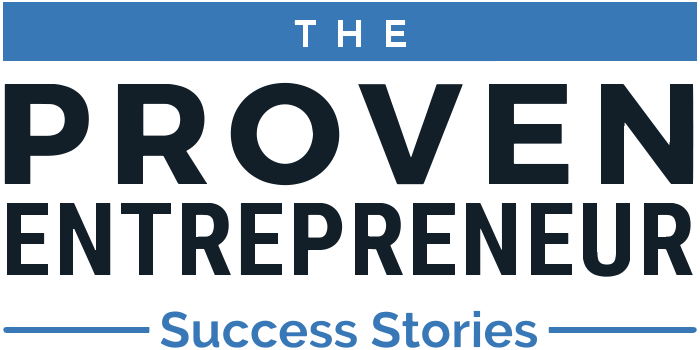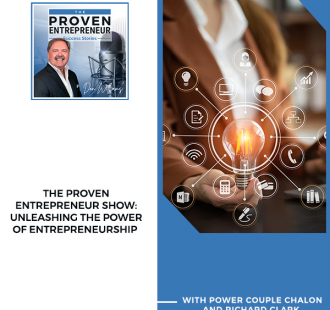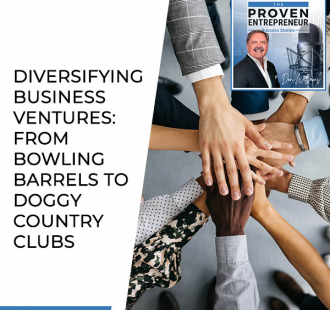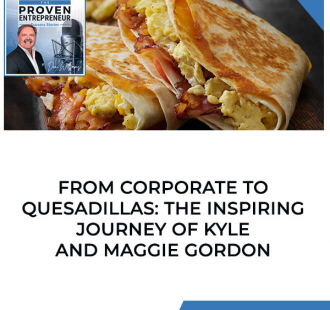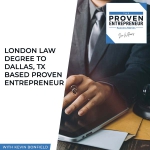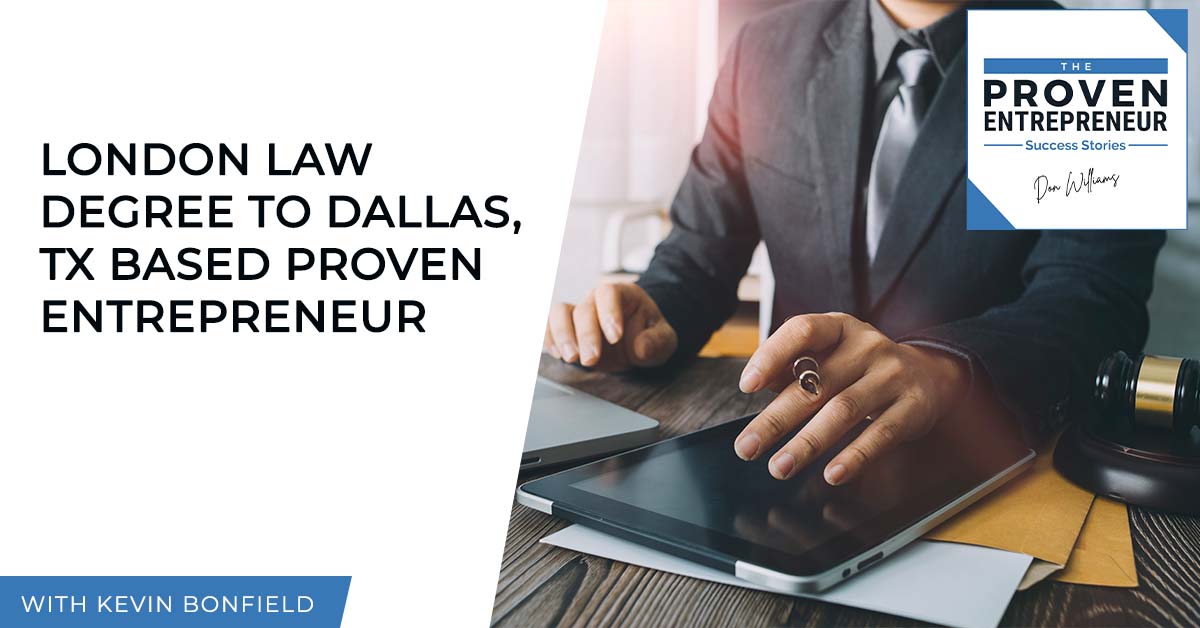
The path to success in entrepreneurship is not straight. Here to share his journey is Kevin Bonfield, founder of Concentre and co-owner of EcoClean. From growing up in the UK and studying law to migrating to Texas and starting multiple businesses, Kevin has certainly taken a less orthodox to business success but has achieved it either way. Listen in to learn more about his journey and gain perspective on what works as he chats with host Don Williams.
—
Listen to the podcast here
Kevin Bonfield – London Law Degree To Dallas, TX Based Proven Entrepreneur
I am with my good friend and EO buddy, Kevin Bonfield over in EO Dallas. Kevin, welcome to the show.
It is good to see you, Don.
Thank you so much for coming over. Kevin, tell me about your company. What are you doing? What are you passionate about? Tell me about your business.
I have two businesses. I have a boutique consulting company. We work with mid-size and enterprise customers helping them do operational improvement and performance improvement. I have an eco-friendly dry cleaner that operates in Austin. We have got three locations. We pick up and deliver your laundry from your door.
Let’s go back to the consulting business. How long have you had that company?
I have had that company for many years.
What do you do?
A good example of work that we have done is helping a client of ours. They were shifting their strategy so they were going in direction A and wanted to go into direction B. We went and helped them find the resources, the people, the money and the costs that they were already spending going in this direction. We picked them up and redeploy them to go in a new direction. We call that Fund the Future service that we have branded. We helped them find millions of dollars to be able to go and accelerate what they wanted to go and do next.
That is a multi-month or multi-year project?
Typically, it’s multi-month. We have had clients whom we do work with them over the years but typically that is multiple projects all tied together. Fund the Future is usually something that we get a good sense of what its shape looks like in the first six weeks and then the rest of its execution. This one took about 5 to 6 months to get through and make sure that we had captured all the benefits that they wanted.
The eco-friendly dry cleaning business in Austin, which is not where you live, how long have you been in that business?
Similar years in that business. It was an interesting start to that particular business because my business partner had been talking to the owners for about a year beforehand. We disagreed on what the price of the business should be. It was losing money. Our perspective was something that is losing money in the long-term is not worth very much. They had a different perspective. They lost some more money for another year and then we came back with a proposition, which was, “If we come in, run this for you and make it profitable, how about you give half of it to us?” Half of something is worth more than all of nothing. That is what we did.
Things are never as bad as you think they are, and they are never as good as you think they are. Click To TweetLet’s dial the clock and go back to little Kevin. Your accent is not Dallas. Tell us where you are from.
I was born in London on the East side. I grew up in Bolton, which is outside of Manchester in the UK. I moved here when I was 24 and about 1.5 years after I was here, I went and spent 5 months living in Australia as well. My accent is a weird and wonderful mixture of all of those things.
Back to young Kevin, were your parents and grandparents entrepreneurial?
I do not think I thought of it as being entrepreneurial but they clearly were. When I was growing up, my mom had her training business, which she still does. My dad has had a series of businesses. He had an office furniture business for a while. He does a lot of work as an extended family office. He has gotten into organic food. When I grew up, I am not sure that I thought that it was like that. I remember exactly the day when he became an entrepreneur. I had been at school, came home and he was sitting there at the dining table in our kitchen. I was like, “You are home early.” He had been let go from his business. That was his first day of moving on to be an entrepreneur. He did that when I was 13 or 14.
It’s such a rebel. He got laid off from a job and said, “I am going to go start my company.”
He had been running a business within a larger conglomerate for a while. He viewed himself as being entrepreneurial anyway but he went and did the next thing. It was good.
I was 12, maybe 11 when my dad was laid off from a job. It is a similar story. I came home and he was there. I was like, “Why are you here?” It was a shock. He explained that we were beginning a family vacation the following day and that we would be gone for six weeks in the middle of the school year. My question was, “Is that going to be okay?” He said, “Sure, it is going to be okay.” Off we went. He is a little bit of a rebel there. I love that.
I need to talk to my dad. I did not get the six-week vacation.
Talk about the first job you have where you got a check. My first job was mowing the yard. I did not get a check but there were consequences if I did not mow the yard.
The first job that I got a check for was a paper route in the UK. I had a double paper route, which meant I got paid £7 a week, which would be $10 a week. The double paper route was twice as long. I had two bags that I carry. The big difference in the UK is you have to put the newspaper in through the mail slot. There is no throwing the paper onto the lawn. You go up, fold it up and put it in through the mail slot. I had two bags. On the paper route when I started, I was carrying about 30 or 40 pounds of paper. I was in good shape.
In the UK, did you also collect from your subscribers?
I did not. The shop did that for us but there’s the best lesson I learned there. I took over this route on the 7th of January and the person who I took it over from said, “If there is one thing that I am going to teach you, it’s this. When it gets to Christmas time, get a bunch of Christmas cards, write one to each of your people and say, ‘Merry Christmas from your paperboy.’ That is all you have to do. Put it in the slots at the beginning of December.” I did that. I made about £50 in tips that first Christmas. The other people in that particular newsagent might have made £5 or £7. That was the difference. Write a note and say thank you.

I may need to add that in the sequel to my bestselling book, Romancing Your Customer. That is a good example.
There was one example that I still remember. Most of the time when I would drop off the paper, no one was there. They were all asleep. One morning, I go in and put the thing through the slot. As my hand is pushing this thing through, the door opens. I was like, “What is going on?” There is a man standing there and goes, “Wait there.” I was thinking, “What have I done wrong?” He goes away for a couple of minutes. I have got my bags on and trying to get my wrap done. He comes back and hands me a crisp £5 note. He says, “Thanks very much. You have done a great job.” £5 is 75% of my week’s pay and I was just given it. That was my first romancing your customer moment.
After young Kevin, we are at a young man Kevin. You went to university. People in the US hike across Europe. You came and hiked across the US. Did you join the Merchant Marine? What did you do?
I had a tough time when I went to university. In the UK, most people do the A levels before going to university. In the last 3 months before my A levels that I had been studying for 2 years, I got sick. I am trying to do a revision so that I can get ready for my exams. I would wake up, do fifteen minutes of revision and then be so tired. I would have to sleep for two hours. To the point that the deputy head of the school came, sat at my dining table and we did my A level in my house.
After that, I took a year off because I had done apparently revision. It’s not that great of a need for me because I did a lot better in my exams than I had expected. I needed to get back to it. That was my stepping stone between high school and university. I went and did a Law degree in London before starting to work as a consultant.
Have you ever practiced law?
I have a four-year Law degree but never practiced law. The number of times that I have to use it for contracts and leases was much more than I expected.
I have often said that if I was playing it over, I would have gotten my JD but then never practice law a day in my life. There is a certain amount of training for the legal mind that you do not get in any other discipline.
It is partly that logical discipline. We had mock trials. My university had this fantastic mock court. It was all wood paneling around. You would stand up. The seniors and juniors would come in and they would be the judges. You would have to argue your case. It wasn’t just the logic of thinking through an argument. You had to present it.
After university, did you become a consultant on your own or did you go to work and had a job?
I went to work for Bain & Company as a consultant. That was when I got to work in the UK and Australia. I got to come here for a little bit.
How long were you in the realm of the employed?
Do not lose out on that opportunity to learn from people who know what they are talking about. Click To TweetI was at Bain for about 4.5 years, did a couple of startups here in town and then went to TDS for 4 and a bit years. It is a total of about fifteen years as an employee.
Was that your first company?
Yes.
Thinking back over your career, give me something that happened that was painful but in retrospect has turned out to be something very positive for your journey.
Consulting, at least the way that we have done consulting can be a very painful business because there are times when it is fantastic and you have got more business than you have people and there are other times when you have more people than you have a business. Our biggest challenge was in 2017 when we had two very large clients and long-term customers, our key client contact in both of those companies left their respective companies. We found out about it within the space of about a week.
We worked tirelessly over the next six months to try and get to the stage where our pipeline supported having the team moving forward, trying to engage the team and find more leads. Part of the challenge was doing all that at the last minute. It never worked out as fast as you would like it to. We had another client that looked like it was going to work out and then did not. The hardest part was in the middle of January 2018, I said, “I am sorry. We are not going to make it in our current configuration.” I have to lay off about two-thirds of the team.
If I close my eyes, I know which room I was in, where I was sitting and the meeting was at 3:00 PM. I remember sitting down and looking at my phone at 4:02 PM thinking, “This day sucks.” That was a hard piece. The benefits of it are twofold. I spend a lot more time on business development on a regular basis. The other is we have been more thoughtful about how and when we bring people onto the team. We are more building a family of affiliates who work with us on specific projects rather than bringing in full-time members of the team. Part of that is a risk mitigation issue. I do not want to promise something that I cannot hold up my end of the bargain. I never want to be in that position again.
That is very common certainly in this economy with the use of contractors strategically. There are a couple of different strategies where that are good solutions for that. Thank you for sharing that. What about a warp speed moment? Business is going along well and then a couple of things fall into place that all of a sudden it is that hockey stick. Do you have one of those moments you can share?
The hockey stick moment happened more on the EcoClean side of our business. When we first bought the business, we had one location and in that location, we did both. We had a retail store and our plant in the back. When we decided we were going to go and grow it, the first 2 next stores opened within about 6 weeks of each other. 1 store with plants in the back, going to 3 stores in the period of about 6 weeks, having to deal with the fit-out, putting new POS systems in place, hiring and finding good people. With EcoClean, we still find it challenging to get the right people consistently into our business and have to do that in two new stores all at the same time. It was fun.
What about a nugget, something you know we should know but we do not know and something instrumental in your entrepreneurial journey?
The thing that keeps me centered is that I do not think that things are ever as bad as you think they are and never as good as you think they are. I always come back to that as, “This does not seem great.” There are good times around the corner if I lean in.” Likewise, there have been times when I have looked around and gone, “This is fantastic.” There is something on the line which is a challenge that I need to go and deal with. That has kept me fairly centered as I have gone through this journey.
That is a unique perspective. Thank you for sharing that. If we want to reach out to you, what is the easiest way to reach you?

The easiest way is through my email, Kevin.Bonfield@Concentre.com. There is an interesting story as we were in the process of working out what the name of our business is going to be. Concentre means to align, which is a lot of what we do. We work with leadership teams and get them on the same page so that they can move forward. Concentre has to be spelled with RE because I am British, not an ER. I am telling my wife about this. I said, “This is where we are at. There are 2 or 3 options but Concentre is the name that I like. That is the one that we are going to go with.”
She says to me, “There is another business here in town called Concentra. They are a healthcare company. Do you not think that they are going to confuse you between the two?” I said, “Healthcare consulting, I do not think it is a big deal. What is the likelihood that they would ever be a client of ours and that would be confusing?” It was client number two.
I get to ask you the time machine question. We have a time machine. You are getting in. We are taking you back to twenty-year-old Kevin. For no more than 5 minutes, you can only discuss 1 topic. What one piece of advice would adult Kevin give twenty-year-old Kevin that would help you on your entrepreneurial path?
I was chatting to my eldest daughter about this. The biggest thing that I missed out on was getting good sales training. When I was at TDS, I was going up through the corporate side rather than the account side. I had an opportunity at one point to go and become a Client Executive, which was working with a client. As I looked at the options, the pay was about the same, the title was not as good and it looked like if I stayed on the corporate side, I was going to get up the rankings. I stayed on that side and did not go and do the sales piece.
I understand how to do that well from people who understand it. I have picked it up over time but it is me practicing at it. It is not where I have had formal sales training where I know what the ABCs are. To go through that with people who know what they are doing and learn from them how they build relationships, solve problems and make sure that the solution fits what the needs of a customer are is what I would go back to. I would tell a twenty-year-old Kevin, “Do not lose out on that opportunity to learn from people who know what they are talking about.”
I shared this with you before but from The Book of Don, when I look at businesses’ negative issues and problems, about half of them are caused because we do not bring enough money in. If we solve that problem and bring in enough money, half the problems will evaporate. We will have enough budget to hire people to fix the other half. It will not be an issue.
I have spent time going back and looking at the different areas in my business but especially on the consulting side. When I am overweighted into business development activities like reaching out to people, grabbing a coffee, seeing what they are up to and building proposals, the company grows. When I get wrapped up in delivering a particular project for a client, that is when it all stops. I am not going to underweight my business development time anymore.
Kevin, thank you so much for coming on the show. I reserve the right to recall the witness at a later time on a different topic. Please come back. Thank you. That is it for this episode.
Important Links
- Kevin Bonfield
- EO Dallas
- Fund the Future
- Romancing Your Customer
- EcoClean
- Kevin.Bonfield@Concentre.com
- The Book of Don
About Kevin Bonfield
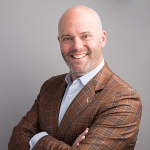 Legacy is defined in the minds of others, but when you live your passion and purpose you can create legacy. Every day you make decisions leading your team. Every decision, every interaction leaves an impact. An imprint on the people you lead, the people you work with and the technology you unleash. Concentre is a boutique consulting company. Our focused and experienced teams work side by side with you to turn your organization’s purpose and business strategy into technology results. We do that by aligning business with vision, technology with the business and the elements within technology.
Legacy is defined in the minds of others, but when you live your passion and purpose you can create legacy. Every day you make decisions leading your team. Every decision, every interaction leaves an impact. An imprint on the people you lead, the people you work with and the technology you unleash. Concentre is a boutique consulting company. Our focused and experienced teams work side by side with you to turn your organization’s purpose and business strategy into technology results. We do that by aligning business with vision, technology with the business and the elements within technology.
